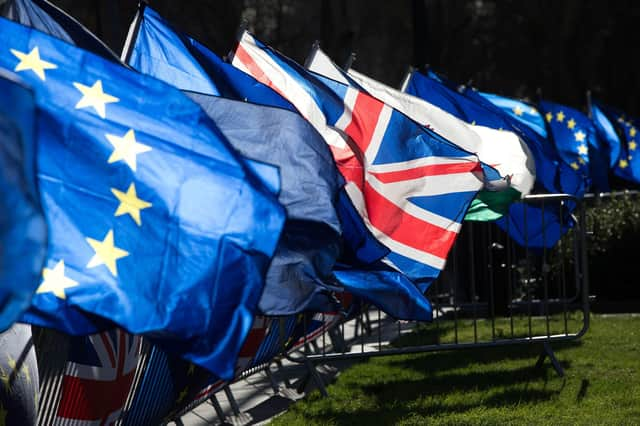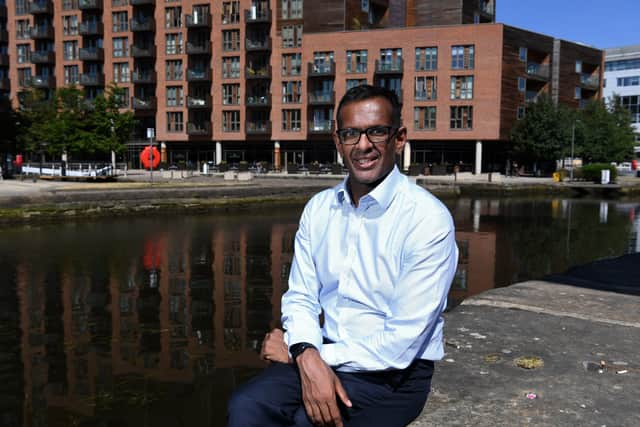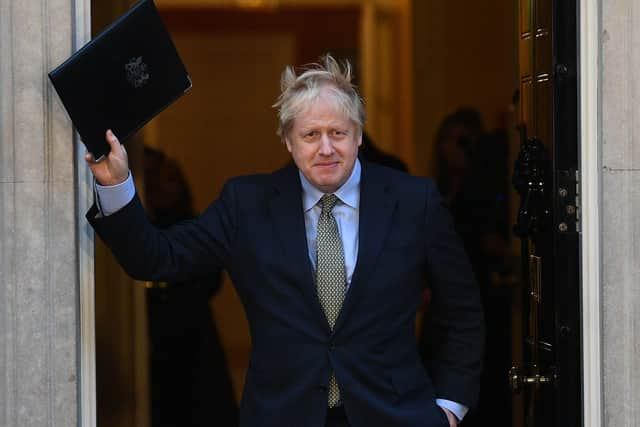No deal is a big deal as Brexit trade war and Covid costs looms – Anand Menon


Nevertheless, just under a year on from that negotiation, we may still end up without a trade deal. “We will prosper mightily,” the Prime Minister believes.
But, as a recent report by the UK in Changing Europe makes clear, there are no grounds for such complacency: the impacts of no deal would be wide-ranging and significant.
Advertisement
Hide AdAdvertisement
Hide AdSo, what has changed? Well, we now have a Withdrawal Agreement approved by Parliament last January. This settled issues of citizens’ rights, determined the UK’s financial settlement and put in place arrangements to avoid the re-emergence of a hard border between Northern Ireland and the Republic of Ireland.


That is all now in an international treaty, ratified by both sides, and enshrined in UK law in January 2020 (though only time will tell how seriously the British government takes its commitments).
What the Withdrawal Agreement did not do was agree the nature of the future relationship between the UK and the European Union. And as the negotiations appear stuck, with both sides apparently digging in and refusing to shift their red lines, the prospect of a no trade deal outcome is all too real.
That this will have significant consequences should come as no surprise to opponents of membership. They have, after all, long complained about the way the EU has intruded into numerous aspects of national life. Were the abrupt termination of this relationship to cause no disruption, one might be led to wonder what all the fuss was about in the first place.
Advertisement
Hide AdAdvertisement
Hide AdDisruption, however, there will be. A shift to trade on World Trade Organisation terms cannot but have repercussions. That means not just tariffs on goods going from the UK to the EU and vice versa, but customs checks, new regulatory barriers and much more.


The Government has already accepted this by making provision for large lorry parks to cope with queues at the border and announcing that it plans to implement full checks at the border only by July 2021. Even then, the New Goods Vehicle Management system, due to be trialled in November, might not be fully operational.
Problems at ports will have an impact, potentially on supplies of fresh products and certainly on those sectors such as the car industry that depend on just-in- time supply chains that in some cases crisscross the UK-EU border several times.
Being outside the EU regulatory sphere implies additional hassle and fees. Businesses will face extra bureaucracy to ensure their goods meet EU standards before they can be sold there – even if UK standards remain the same. And goods will be checked for conformity with EU standards. Tariffs, meanwhile, imply higher prices.
Advertisement
Hide AdAdvertisement
Hide AdThe combination of these factors means increased cost for businesses, and potentially a big hit to the British economy. Yes, the ongoing pandemic may partially hide the impacts but in the long run, Brexit is likely to be a bigger economic issue. Our modelling suggests a no deal could imply a reduction in UK GDP of some eight per cent over the next 10 years, larger than most estimates of the lasting impact of Covid-19.
No deal also means the prospect of increased prices for consumers, especially for food as both sides apply tariffs. There will also be less obvious but nevertheless important implications, for example on security co-operation. And then there is the potential diplomatic fallout. In a sense this might be the most pronounced difference between a deal and no deal.
Remember, what Boris Johnson wants is, by any account, a “skinny” free trade deal with the EU. Even should he get one, this would not necessarily avert many of the consequences outlined above.
But a deal would at least allow the two sides to keep talking. Should the negotiations fail, one can easily imagine them descending into a vicious circle of mutual recrimination as each side blames the other for the fallout and a form of low-level trade war, fought out over fish, road and air travel, and financial services.
Advertisement
Hide AdAdvertisement
Hide AdUnder such circumstances, not only would it be hard if not impossible to restart negotiations, but wider forms of co-operation would also suffer. It is hard to imagine, for instance, a British Minister sitting down with European colleagues in a Nato meeting and all of them acting as if nothing at all was going wrong elsewhere.
So no deal is indeed a big deal. The absence of an agreement when transition ends will have severe practical, economic and diplomatic consequences. It is conceivable that the Government believes it can ride these out, hiding the economic shock behind that generated by lockdown. Perhaps it can. But don’t say we didn’t warn you.
Anand Menon is director of UK in a Changing Europe, and professor of European politics and foreign affairs at King’s College London.
Support The Yorkshire Post and become a subscriber today.
Your subscription will help us to continue to bring quality news to the people of Yorkshire. In return, you’ll see fewer ads on site, get free access to our app and receive exclusive members-only offers.
Advertisement
Hide AdAdvertisement
Hide AdSo, please - if you can - pay for our work. Just £5 per month is the starting point. If you think that which we are trying to achieve is worth more, you can pay us what you think we are worth. By doing so, you will be investing in something that is becoming increasingly rare. Independent journalism that cares less about right and left and more about right and wrong. Journalism you can trust.
Thank you
James Mitchinson
Comment Guidelines
National World encourages reader discussion on our stories. User feedback, insights and back-and-forth exchanges add a rich layer of context to reporting. Please review our Community Guidelines before commenting.